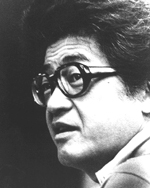 W
WKōbō Abe , pen name of Kimifusa Abe , was a Japanese writer, playwright, musician, photographer and inventor. Abe has been often compared to Franz Kafka and Alberto Moravia for his modernist sensibilities and his surreal, often nightmarish explorations of individuals in contemporary society.
 W
WRyūnosuke Akutagawa , art name Chōkōdō Shujin (澄江堂主人), was a Japanese writer active in the Taishō period in Japan. He is regarded as the "father of the Japanese short story", and Japan's premier literary award, the Akutagawa Prize, is named after him. He died by suicide at the age of 35 through an overdose of barbital.
 W
WIkuma Arishima was the pen-name of Arishima Mibuma, a Japanese novelist and painter active in the Taishō and Shōwa period. He also used Utosei and then Jugatsutei as alternative pen names.
 W
WNaoyuki Uchida , who writes under his pen name Yukito Ayatsuji , is a Japanese writer of mystery and horror. He is one of the founders of Honkaku Mystery Writers Club of Japan and one of the representative writers of the new traditionalist movement in Japanese mystery writing. His wife is Fuyumi Ono, a Japanese fantasy and horror writer who is known for her fantasy series The Twelve Kingdoms.
 W
WOsamu Dazai was a Japanese author who is considered one of the foremost fiction writers of 20th-century Japan. A number of his most popular works, such as The Setting Sun (Shayō) and No Longer Human, are considered modern-day classics in Japan. With a semi-autobiographical style and transparency into his personal life, Dazai's stories have intrigued the minds of many readers.
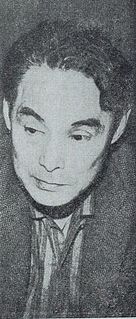 W
WYutaka Haniya was a noted Japanese author.
 W
WKaitarō Hasegawa was a novelist in the early Shōwa period Japan. He wrote under numerous pen names, each with a unique personality, and caused a sensation with the sheer brilliance of his fiction, non-fiction and translations.
 W
WJūran Hisao was the pen-name of a Japanese author of popular fiction in Shōwa period Japan. Hisao Jūran was a pioneer in the use of black humor in Japanese literature. His works reflect his extensive knowledge of a wide range of subjects, and displayed extraordinary skills, and range from mystery tales to humor, and both historical and contemporary settings. His real name was Masao Abe .
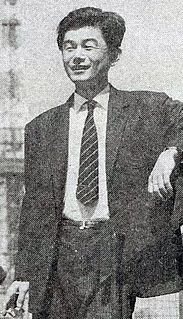 W
WShinichi Hoshi was a Japanese novelist and science fiction writer best known for his "short-short" science fiction stories, often no more than three or four pages in length, of which he wrote over 1000. He also wrote mysteries and won the Mystery Writers of Japan Award for Mōsō Ginkō in 1968.
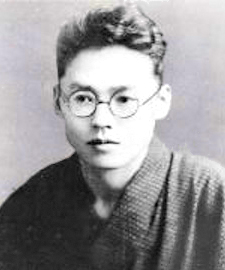 W
WMasuji Ibuse was a Japanese author. His most notable work is the novel Black Rain.
 W
WJun Ishikawa was the pen name of a modernist author, translator and literary critic active in Shōwa period Japan. His real name was Ishikawa Kiyoshi.
 W
WYōjirō Ishizaka was an influential and popular novelist of post-World War II Japan.
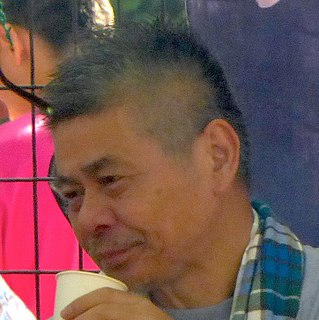 W
WShigesato Itoi is a Japanese copywriter, essayist, lyricist, game designer, and actor. Itoi is the editor-in-chief of his website and company Hobo Nikkan Itoi Shinbun. He is best known outside Japan for his work on Nintendo's Mother/EarthBound series of games, as well as his self-titled bass fishing video game.
 W
WTakeshi Kaikō was a prominent post-World War II Japanese novelist, short-story writer, essayist, literary critic, and television documentary writer. He was distinguished by his knowledge, intellect, sense of humor and conversational skills, and although his style has been criticized as wordy and obtuse, he was one of the more popular Japanese writers in the late Shōwa period.
 W
WMotojirō Kajii was a Japanese author in the early Shōwa period known for his poetic short stories. Kajii left behind masterpieces such as Remon , "Shiro no aru machi nite" . Fuyu no hi and Sakura no ki no shita ni wa . His poetic works were praised by fellow writers including Yasunari Kawabata and Yukio Mishima. Today his works are admired for their finely tuned self-observation and descriptive power.
 W
WYasunari Kawabata was a Japanese novelist and short story writer whose spare, lyrical, subtly-shaded prose works won him the Nobel Prize for Literature in 1968, the first Japanese author to receive the award. His works have enjoyed broad international appeal and are still widely read.
 W
WMatsutarō Kawaguchi was a Japanese novelist, playwright and film producer active during the Shōwa period of Japan.
 W
WHidemi Kon was a literary critic and essayist active in Japan during the Shōwa period.
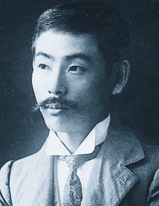 W
WDoppo Kunikida was a Japanese author of novels and romantic poetry during the Meiji period, noted as one of the inventors of Japanese naturalism.
 W
WYukio Mishima , born Kimitake Hiraoka was a Japanese author, poet, playwright, actor, model, Shintoist, nationalist, and founder of the Tatenokai . Mishima is considered one of the most important Japanese authors of the 20th century. He was considered for the Nobel Prize in Literature in 1968, but the award went to his countryman and benefactor Yasunari Kawabata. His works include the novels Confessions of a Mask and The Temple of the Golden Pavilion as well as the autobiographical essay "Sun and Steel". Mishima's work is characterized by "its luxurious vocabulary and decadent metaphors, its fusion of traditional Japanese and modern Western literary styles, and its obsessive assertions of the unity of beauty, eroticism and death."
 W
WLieutenant-General Mori Rintarō , known by his pen name Mori Ōgai , was a Japanese Army Surgeon general officer, translator, novelist, poet and father of famed author Mari Mori. He obtained his medical license at a very young age and introduced translated German literary works to the Japanese public. Mori Ōgai also was considered the first to successfully express the art of western poetry in Japanese. He wrote many works and created many writing styles. The Wild Geese (1911–1913) is considered his major work. After his death, he was considered one of the leading writers who modernized Japanese literature.
 W
WHaruki Murakami is a Japanese writer. His books and stories have been bestsellers in Japan as well as internationally, with his work being translated into 50 languages and selling millions of copies outside his native country. His work has received numerous awards, including the World Fantasy Award, the Frank O'Connor International Short Story Award, the Franz Kafka Prize, and the Jerusalem Prize.
 W
WSaneatsu Mushanokōji was a Japanese novelist, playwright, poet, artist, and philosopher active during the late Taishō and Shōwa periods of Japan. Later on in life he requested that the pronunciation of his surname be changed from the usual Mushanokōji, to Mushakōji, but without much success. He was nicknamed Musha and Futo-o by his colleagues.
 W
WTatsuo Nagai was a writer of short stories, novels, and essays, active in the Shōwa period Japan, known for his portrayals of city life. Nagai was also known as a haiku poet under the pen-name of "Tomonkyo".
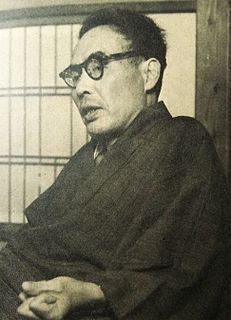 W
WGishū Nakayama was the pen-name of a Japanese writer active in Shōwa period Japan. His real name was Yoshihide Takama.
 W
WNatsume Sōseki , born Natsume Kin'nosuke , was a Japanese novelist. He is best known around the world for his novels Kokoro, Botchan, I Am a Cat and his unfinished work Light and Darkness. He was also a scholar of British literature and composer of haiku, kanshi, and fairy tales. From 1984 until 2004, his portrait appeared on the front of the Japanese 1000 yen note. In Japan, he is often considered the greatest writer in modern Japanese history. He has had a profound effect on almost all important Japanese writers since.
 W
WKenzaburō Ōe is a Japanese writer and a major figure in contemporary Japanese literature. His novels, short stories and essays, strongly influenced by French and American literature and literary theory, deal with political, social and philosophical issues, including nuclear weapons, nuclear power, social non-conformism, and existentialism. Ōe was awarded the Nobel Prize in Literature in 1994 for creating "an imagined world, where life and myth condense to form a disconcerting picture of the human predicament today".
 W
WMimei Ogawa was an author of short stories, children's stories, and fairy tales. Because he was one of the first authors to publish children's stories under his own name, Ogawa has been called Japan's Hans Christian Andersen, an appellation he shares with Kurushima Takehiko.
 W
WShōhei Ōoka was a Japanese novelist, literary critic, and lecturer and translator of French literature who was active during the Shōwa period of Japan. Ōoka belongs to the group of postwar writers whose World War II experiences at home and abroad figure prominently in their works. Over his lifetime, he contributed short stories and critical essays to almost every literary magazine in Japan.
 W
WOtsuichi is the pen name of Hirotaka Adachi , born 1978. He is a Japanese writer, mostly of horror short stories, as well as a filmmaker. He is a member of the Mystery Writers of Japan and the Honkaku Mystery Writers Club of Japan.
 W
WTon Satomi is the pen-name of Japanese author Hideo Yamanouchi. Satomi was known for the craftsmanship of his dialogue and command of the Japanese language. His two elder brothers, Ikuma Arishima and Takeo Arishima, were also authors.
 W
WTatsuhiko Shibusawa was the pen name of Shibusawa Tatsuo, a novelist, art critic, and translator of French literature active during Shōwa period Japan. Shibusawa wrote many short stories and novels based on French literature and Japanese classics. His essays about black magic, demonology, and eroticism are also popular in Japan.
 W
WNaoya Shiga was a Japanese novelist and short story writer active during the Taishō and Shōwa periods of Japan.
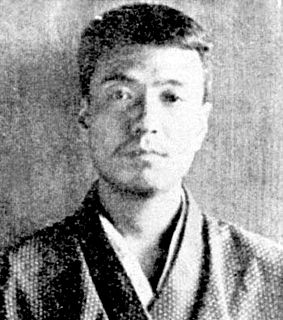 W
WKyoshi Takahama was a Japanese poet active during the Shōwa period of Japan. His real name was Takahama Kiyoshi (高浜清); Kyoshi was a pen name given to him by his mentor, Masaoka Shiki.
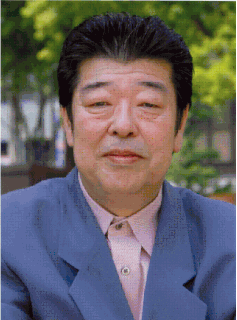 W
WKatsuhiko Takahashi is a Japanese writer of mystery, horror, science fiction and historical fiction. He is a member of the Mystery Writers of Japan.
 W
WSatomu Shimizu , better known by the pen name of Shūgorō Yamamoto , was a Japanese novelist and short-story writer active during the Shōwa period of Japan. He was noted for his popular literature, and is known to have published works under at least fourteen different pen names.
 W
WShōtarō Yasuoka was a Japanese writer.
 W
WJunnosuke Yoshiyuki was a Japanese novelist and short-story writer.
 W
WYumeno Kyūsaku was the pen name of Sugiyama Yasumichi , early Shōwa period Japanese author, Zen priest, post office director and sub-lieutenant. The pen name roughly means "a person who always dreams". His Dharma name was Goshin-in Gin'en Taidō-koji (悟真院吟園泰道居士). He wrote detective novels and is known for his avant-gardism and his surrealistic, wildly imaginative and fantastic, even bizarre narratives. His eldest son, Sugiyama Tatsumaru, was known as the Green Father of India.